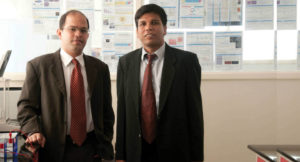The founder of Norwest-backed startup, Attune Technologies, shares vital lessons on cracking fund raising and B2B sales in the healthcare solutions space.
When Arvind Kumar was working as a Technical Specialist at the Philips Innovation Campus, the company often used to organise open discussions wherein it invited subject matter experts or entrepreneurs to share their perspectives with employees. One such session translated into a turning point for Kumar. An IISC professor and the inventor of Simputers (similar to a palmtop or an iPad) had once come to the campus to address 2,000 employees. During his talk, he asked the audience a question; what, in your estimate, is the contribution of technology towards the commercial success of a product? While the responses ranged from 80 per cent to 90 per cent, Kumar, assuming he was making a modest estimate, said 60 per cent. The correct answer, however, was 10 per cent, according to the professor.
“Can you imagine our shock? My best case effort was contributing to only 10 per cent of the product’s commercial success!” he claims with the same tone of disbelief even after years. Denial turned to curiosity and eventually, Kumar decided to learn about the other 90 per cent by pursuing a management degree at IIM Calcutta. Midway in the second year of his MBA, he turned entrepreneur. “The day I chose to break the news about my venture to my family, The Economic Times carried front page news about an IIM Calcutta graduate earning a crore a month,” he pitches in. What followed was a series of tough challenges and lessons on convincing your family to let me startup, fund raising to sustain the venture and mastering the art of B2B sales in local and global geographies. “What I’m sharing with you is a compiled version of the experiences I’ve had as an entrepreneur. Had I had this insight earlier, things would have been much smoother,” he chuckles.
The current scenario
Today, Attune Technologies, co-founded by Kumar and Ramakrishnan, develops healthcare software solutions to integrate and centralise all patient data and workflow on cloud, for hospitals, diagnostic labs and clinics. In the diagnostic labs segment, it has partnered with the three key market leaders in India; Thyrocare, Metropolis and Medall, and in the global markets, it has partnered with healthcare units across Singapore, Malaysia, Indonesia, Philippines, Sri Lanka and Kenya. With a current team size of 270, the company is doubling in revenues every year, and has recently (in October 2015) raised a US $10 million Series B round from Qualcomm Ventures and Norwest Venture Partners.
Learning the ropes
As most entrepreneurs would agree, fund raising was no easy task for the entrepreneur duo. At the early stage, once the founders began implementing the business idea, they were given a commitment of Rs. 80 lakh from three angel investors. Note that, this was during a time when markets were struck by the global financial crisis. “The plan was to use the money to acquire the first 25 customers, and then raise a Series A,” says Kumar. However, things turned haywire when two investors backed out due to the crisis, and the founders were left with only 20 per cent of the money from the first investment. “We didn’t even have enough money to pay the next month’s salaries. We were absolutely convinced that the only way ahead was to raise money because we were operating on a SaaS model and our product was not ready,” he recalls.
Hence, the founders adopted several strategies to keep the company afloat. First among them was to identify potential investors who have invested earlier in similar ventures. “You need to know how they evaluate companies, who the investors trust so you can establish a rapport with them, how much they usually invest and more,” says Kumar. Secondly, you need to be in the mind space of the investors at all times. “This is something we did religiously. For every product feature update, every new customer we signed on board, every small expansion we made, we sent a mail to our stakeholders, potential customers and investors. This is a great sales pitch,” he advices.
A third strategy the founders adopted was to onboard a few large clients to showcase to potential investors. Here, Kumar shares an interesting anecdote. “I once had an appointment with Aarthi Scans, the Chennai-based diagnostic labs chain. After waiting outside for over four hours, the person I met heard my pitch for two minutes and turned me down (because he hadn’t eaten in a long time and he was a diabetic patient). I requested for a second appointment the very next day. This time, he showed some interest and after nine meetings, he wanted to take a second opinion from his relative in Singapore. I almost wrote him off as a potential customer,” recalls Kumar. However, one thing led to another and Kumar and his co-founder were introduced to a Singapore-based lawyer, Ravindran Govindan. “Until then, between us (founders) we had met and were turned down by close to 30 investors. Even worse, we were given a few hours notice for the meeting and my co-founder didn’t even have a formal shoe to wear for the meeting!” exclaims Kumar as he recalls the moment. However, things took an unexpected turn when they met Govindan. As Kumar says, “He didn’t even see our presentation. He just said, I like you guys so I’m investing in your business. But, I want you to shift headquarters to Singapore. Now, I had my doubts. Will he honour his commitment? Should I be honest with him about our current situation or will he change his mind?” But this time around, the company did receive US $ 1 million led by the lawyer and other undisclosed investors, it moved its headquarters to Singapore and Govindan joined Attune as the chairman.
Soon after that, in November 2012, as per the founders’ initial plan, Attune raised a Series A round to the tune of US $6 million from Norwest Venture Partners, and as a part of the deal, Mohan Kumar, the executive director, joined the board of Attune. “The most important lesson we learnt here was, when you are put in a tough situation as an entrepreneur, it is important to push your psychological and physical boundaries, and work continually towards your goal,” advices Kumar.
Closing the sales loop
When it comes to B2B sales, the founders adopt a different strategy in the local and overseas markets. “There are two ways you can create a sale; either by reaching out to your customer directly, or by identifying a strategy to make them reach out to you,” states Kumar. In his own words, his calling was never in the sales domain, hence, he had to learn the art of selling from scratch. “One of the biggest sales lessons I learnt was, how do I know whether this customer will potentially buy my product in the next three months or not?” The answer lay in not pitching the company’s software at all, in the first place. “From a sales standpoint, we are subject matter experts in this area so our pitch was, we are experts in this domain so we can come and help you with all operational issues in running a hospital, lab or clinic,” he says.
The next obvious question would be, how should Attune prove its credibility? To tackle this, the team began writing case studies and e-books about technical issues in running operations at client terminals and began sharing it with prospective customers. In essence, the idea was to share knowledge so that when the customer wants to buy such a software, they would approach subject matter experts (such as Attune) to fulfil their needs.
While this worked well in local markets, when entering new, global markets, the company had to tweak its strategy to an extent. “In a global market, we go all out to get our first reference customer. Secondly, we create content that proactively addresses all concerns a client may have, such as; you are not present in Indonesia, how will you service me?” At the third level, the company would present case studies and share it with prospective customers, so they gain confidence in the company’s solutions. “In other words, we would appear to be people who understand customer concerns and address them,” states Kumar.
After traversing through a six-year journey filled with vital lessons on fund raising, sales and employee management, today, Attune has 100 clients on board across global markets, and witnesses close to 50,000 new patient records being logged into the system every day. In three years, the company aims to sign 8,000 to 10,000 customers on board and record an overall patient log of 100 million. Despite the ups and downs faced through the journey, Kumar remains upbeat about the future of the company. “We are in a position where we will be able to build great product companies from India and market it within the country and outside. In the long term, we hope see ourselves evolved into pioneers in this space,” he says on a concluding note.
CRACKING B2B SALES
There are two ways to approach this; either reach out to your customer directly, or identify a strategy to make them reach out to you. And, ask yourself this question, how do I know whether this customer will potentially buy my product in the next three months or not?
One way to answer this question is to position yourself as subject matter experts. Develop case studies and e-books about
the various operational challenges a hospital, clinic or lab may face, and share it with potential clients. When the customer wants to buy such a software, they would approach subject matter experts (such as Attune) to fulfil their needs.
When targeting clients in new markets, follow the same steps but precede it by going all out to get your first reference customer, and address concerns about how a company headquartered in another country can understand and serve their needs.
THE ART OF FUNDRAISING
Don’t lose hope. Push your psychological and physical boundaries and continue to work towards your goal.
Identify potential investors for your business and map their moves from scratch; know how they evaluate companies, who the investors trust so you can establish a rapport with them, how much they usually invest and more.
Be in the mind space of potential investors. Keep them updated about every progress made in your business; new product features added, new customers signed on board, recent expansions, etc.




